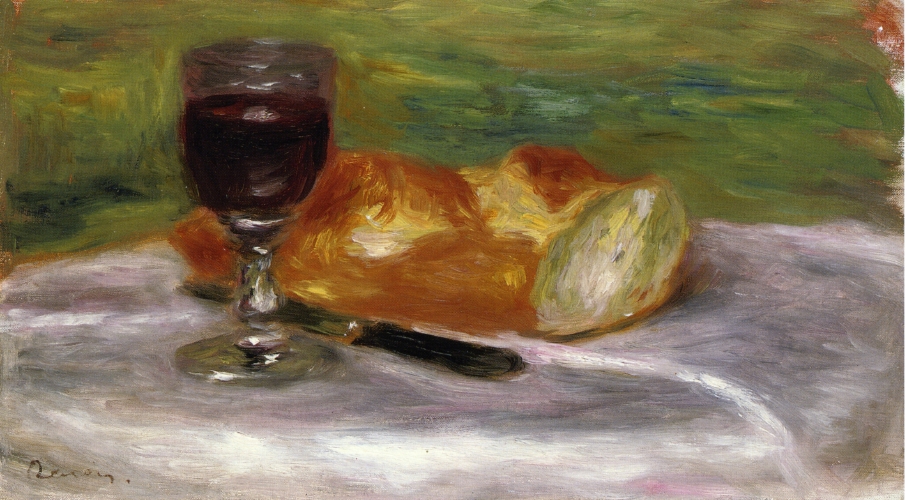Thou dost cause the grass to grow for the cattle, and plants for man to cultivate that he may bring forth food from the earth, and wine to gladden the heart of man, oil to make his face shine, and bread to strengthen man’s heart. (Psalm 104: 14-15)
I recently saw the announcement that the Monks of Norcia (whose monastery is built over the house where St. Benedict was born) have begun to sell their [exquisite] beer in the United States. The motto of their new brewery is taken from Psalm 104, that great hymn of praise to God for the many wonders of His creation: ut laetificet cor, “that the heart may be gladdened.”
The idea of wine gladdening man’s heart has always struck me whenever this Psalm comes up in the Divine Office: it suggests a deeper, more virtuous use of the fruit of the vine, one which our culture has too easily forgotten. Usually when we think of wine producing happiness it is in a boisterous, carousing sort of context that tends to suggest intemperate consumption. But the gladdening of the heart referred to in Psalm 104 calls to mind the sharing of a glass of wine in a quiet and intimate setting, perhaps of a family gathered together after a long day to enjoy each others’ company. A nice glass of wine can also recall our minds to the presence of God within and around us and so strengthen our Lenten observance.
How so?
St. Clement of Alexandria, the early Church Father who promoted the integration of a healthy intellectual life with the Christian Faith, describes in his Paedegogus
A specifically Christian type of character, primarily modeled on the example of the Lord Himself, frugal, humble, unselfish, generous, and cheerful. It is seen in a courtesy expressed in the smallest details of life—in a man’s gait when walking, in his behavior at meals, and in ordinary social contacts.
For the Christian, any occasion can afford the opportunity to call to mind the presence of God in our lives. St. Clement gives the example that “the glass of wine which the Christian drinks when he is out to dinner must be to him a reminder of the sacrament of our redemption, and he will therefore drink with reverence.”
This idea of a characteristically Christian conduct in the ordinary affairs of life has not disappeared from the spiritual wisdom of the modern saints. St. Josemaria Escriva, for instance, reminds us that every moment should be an opportunity for the Christian to practice even the tiniest mortification, such as withholding the sugar from our coffee or the salt from our French fries. In these small acts we not only detach ourselves from the peremptory push and pull of our passions but we also call to mind God’s great paternal love for us which He exemplified by sending us Jesus to die to save us.
The season of Lent is our great yearly reminder to give God pride of place in our lives, and we are especially meant to accomplish this through prayer, fasting, and almsgiving. Through each of these activities we manifest and reclaim the Christian character which we have perhaps neglected over the past year and, in doing so, develop the habit of keeping God’s presence always in mind.
That glass of wine with dinner can remind us of the chalice of Christ’s blood, the first given to warm our hearts and the second to save our souls. The bread we eat with our coffee at breakfast can remind us of the Holy Eucharist which we have received at Mass today. The small mortification we make in our meal or the small kindness we pay our neighbor can remind us of the simplicity and gentleness of Christ, who calls us to embrace His love and mercy particularly in this season of Lent. Let’s make a resolution to try every day to call God’s presence to mind, and in that we will accomplish Our Lord’s command to “pray always” (Luke 18:1). When we are constantly conscious of God’s presence within us, how could our heart fail to be gladdened?
✠
Image: Pierre-Auguste Renoir, Glass of Wine







